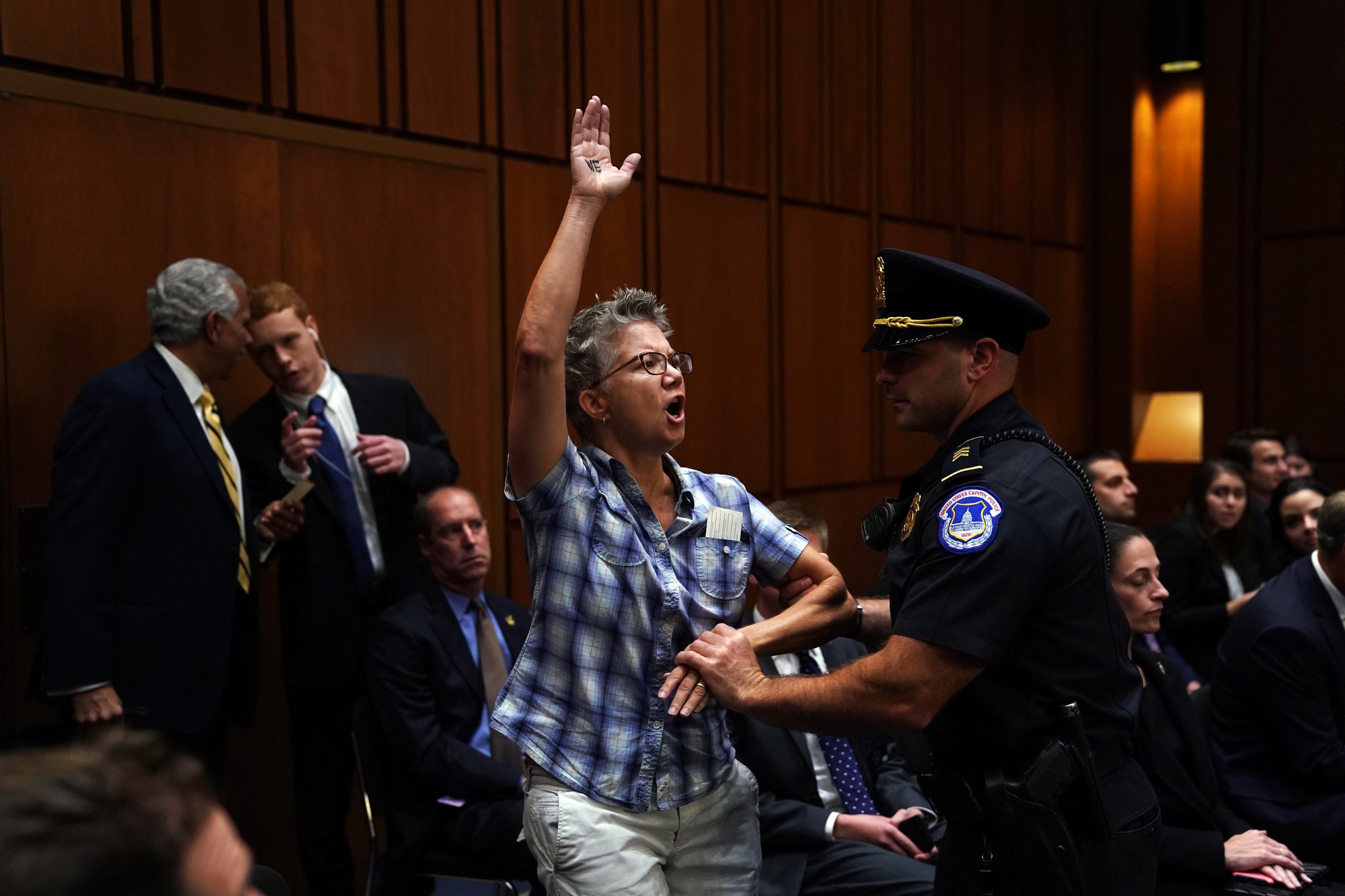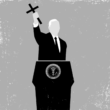Supreme Court nominee Brett Kavanagh so far has done precisely what his Republican handlers on and off Capitol Hill hoped he would do when President Donald Trump picked him this summer at the behest of the Federalist Society and the Heritage Foundation to ensure the court remains the most rigidly conservative it has been in 80 years. Conservative, that is, in ideology, not in judicial temperament, for the Roberts Court over and over again has liberally overturned settled precedent to achieve partisan goals. That’s precisely what Kavanaugh will do once Senate Republicans ram through his nomination.
Over and over again on Wednesday, under questioning from both Republican and Democratic senators, the polished judge, a slick veteran of Washington gobbledygook, offered empty platitudes about judges and judging, history and precedent, and the interaction between the three branches of government. All of his answers were designed to say as little as possible of substance about the law and his right-wing ideology; all of his comments were designed to mollify those Americans who might have dipped into Wednesday’s television coverage or checked out the day’s headlines. “I have no agenda in any direction,” he said at one point.
He was calm, he was rational, he clearly was in control of the details of law and precedent. And why shouldn’t he be? He’s been practicing his whole life for the gig, carefully checking off all the conservative Republican boxes the modern judicial nomination system requires. Compared to him Justice Neil Gorsuch was a rank amatuer in knowing how the game is played. Indeed, one could argue, and some already have, that Kavanaugh is the Zelig of his time, present at all of the key moments in the culture wars of the past decade. And always in those moments acting the role of the ardent ideologue and not the dispassionate patriot.
He helped Kenneth Starr hound President Clinton and Monica Lewinsky and he did so in a way that made clear his personal disdain for both targets. And just a few years later, in the wake of 9/11, he helped President Bush orchestrate the war on terror, including the torture of terror law detainees. Kavanaugh denies this role but he also isn’t willing to offer up the executive branch documents that would help us sort it all out. He brings that partisan history, that gleeful work on behalf of conservative causes, into the hearing room this week but it’s not that history Senate Republicans want on display.
Here’s an example of how his handlers tried to direct the narrative away from substance and toward imagery. Sen. Orrin Hatch, the Utah Republican who has spent decades tormenting Democratic nominees and nurturing Republican ones, asked Kavanaugh a series of fluff questions about the nominee’s work with women. It’s a fine record, especially with respect to Kavanaugh’s consistent hiring of female law clerks. It’s a little less clear when it comes to what he knew about the the creepy behavior of 9th U.S. Circuit Court of Appeals Judge Alex Kozinski. But none of that has anything to do with Kavanaugh’s hard-right jurisprudence, which most women’s rights groups around the county say will be devastating to women.
Which brings us to the question of abortion rights. If you looked and listened closely enough you could get tangible clues about the real Kavanaugh, the one who is going to help shape the course of American law for the next 35 years and not the one offering up hollow phrases about umpires. Asked first about Roe v. Wade by Sen. Dianne Feinstein, Kavanaugh said he understood the “real world importance” of the landmark ruling, noted that it had repeatedly been affirmed by the Supreme Court, and then left himself plenty of room to overturn the precedent when the opportunity presents itself after he’s on the court.
You could say the same thing about guns. Here, too, there was a clear dog whistle sounding to anyone listening for it. On assault weapons, for example, when questioned by Sen. Dianne Feinstein, Kavanaugh signaled that he may be to the right of the late Justice Antonin Scalia– let that sink in for a moment— in extending the scope of the Second Amendment to ban regulations designed to keep AR-15s out of the hands of school shooters. And his response to Feinstein’s question about school shootings was as cold and heartless as was his decision Tuesday to shun the parent of a school shooting victim who offered a handshake.
All modern Supreme Court confirmation hearings are surreal affairs. They cover-up with pretty pictures and soundbytes the raw exercise of political power. They only pretend that the nominees are truly judged on their honor and integrity. That explains why there is no Justice Merrick Garland sitting on the Court today and why the unindicted co-conspirator now residing in the White House can sleep soundly tonight knowing the man he picked for the Court soon will be on it, ready to hear argument in whatever grand constitutional showdown is going to come between special counsel Robert Mueller and our addled president.
But there are keen moments of clarity within the broader show. Like when the nominee said, under oath and with a straight face, that he has never analyzed the question of whether a president could pardon himself. Or like when Sen. Lindsey Graham, the South Carolina Republican, used his time to chastise his Democratic colleagues for rushing to judgment against Kavanaugh. This from the folks who refused even to give Merrick Garland the hearing Kavanaugh is getting and who pledged, immediately after Barack Obama became president, that they would obstruct his work in whatever way they could.
On and on it goes. Each question, each evasive, incomplete, unforthcoming answer a reminder of how broken the Supreme Court nomination has become. How little it tells us about what the nominee will or will not do on reaching the Court. There is no mystery here though with this nominee. He was chosen to do the president’s bidding on executive authority, the bidding of Evangelicals in rolling back or destroying abortion rights, and the bidding of corporate America in continuing the Roberts Court’s inexorable agenda against workers, unions, and consumers. Kavanaugh looks and sounds like a judge. One that will help make American measurably less just.
Andrew Cohen is The Spectator‘s legal affairs correspondent.







0 Comments